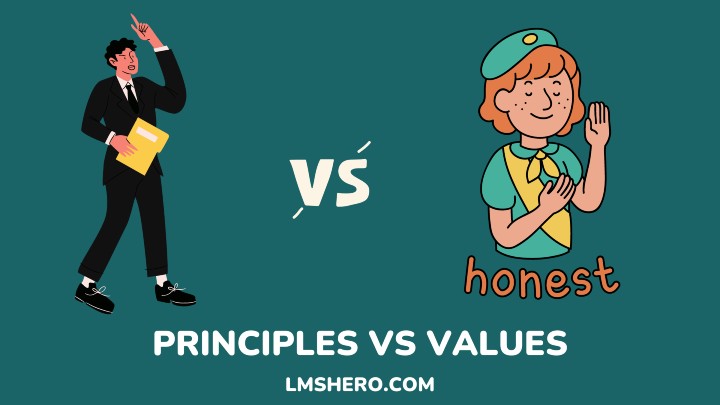A lot of people are often confused about the difference between principles and values. It may seem like principles and values are the same, but they are not.
Principles are personal rules that you set to follow, while values are attributes that set the foundation for principles.
Through this article, you’ll understand the differences between principles and values, their benefits, and their similarities.
What are principles?
A principle is a representation of the moral standards that guide and regulate how people behave in a given society.

Acting in accordance with one’s moral standards is referred to as acting “on principle”. Through the process of socialization, moral principles are ingrained in people.
You can also term principle as a concept or value that serves as a benchmark for judgment or behavior. It is a legal requirement that must be obeyed or is generally expected to be.
It may be a desirable course of action or the unavoidable result of something, such as the natural rules that have been observed or the design of a system.
The absence of rule governance, known as being “unprincipled,” is regarded as a character flaw.
What are the types of principles?
Justice, rational benevolence, and rational self-love, are the three essential types of principles that are frequently referred to as “general rules”. This is because they serve as a guide for choosing what should be done rather than merely stating facts.
What are values?
Values are essential and fundamental ideas that direct or inspire behaviors. They assist us in deciding what matters to us. Values are the character traits we develop and decide to live by to direct our behavior.
They also characterize the type of person you want to be, how you treat yourself and others, and how you interact with the outside world. Values offer broad principles of behavior.
Values can also be referred to as those things that are right, ideal, or worthwhile. The driving force underlying meaningful activity is value. They take many different shapes and are the goals for which we strive.
Personal values are opinions on what is morally right and wrong that may or may not be regarded as such. Cultural values are those that are upheld by cultures or faiths and represent what is significant in each situation.
What are the forms of values?
The forms of values include ethical/moral values, social values, doctrinal/ideological (religious, political) values, and aesthetic values. Values have a tendency to impact attitudes and behavior.
However, it is debatable whether some values, like altruism, which are not obviously determined by physiological factors are intrinsic and whether others, like acquisitiveness, should be categorized as virtues or vices.
What does it mean to be principled?
A person who has a strong sense of fairness, justice, and respect for the worth of individuals, groups, and communities is said to have a strong sense of principles. They accept accountability for their own choices and the results that follow.
You are making a principled choice, or one that is based on moral rightness, if you for example opt to fail a test rather than cheat in it. The majority of individuals adhere to a set of fundamental moral ideals.
Among these include not stealing, not lying, and treating others how you want to be treated.
Here are common qualities you might find in a principled person;
- Honesty
- Respect and Compassion
- Accountability
- Gratitude
- Courage
- Fairness
- Patience/Tolerance
- Humility
- Loyalty
What is the difference between principles and values?
While principles are the laws or convictions that govern one’s behavior, values are characteristics or standards of behavior.
You can see more differences between values and principles in the table below.
| Principles | Values |
| Principles are built on your values | Values contribute to shaping those principles |
| Principles are guidelines or rules you set to guide your actions | Values are traits |
| Standards or principles can be rigid and uncompromising | Values are less rigid than principles |
| Principles frequently regulate interpersonal relationships and human conduct. | In contrast, values are ultimately internal, subjective, and adaptable beliefs and views that individuals have regarding certain issues or ideas. |
| Principles are standards | Values are measures |
| Principles are consistent | Values fluctuate based on the individual conviction |
Principles are founded on a person’s values, which is the primary distinction between values and principles. Therefore, values serve as the cornerstone around which principles are built.
If you value honesty, for instance, you would have a principle called “honesty,” and you would assess how well you or other people adhere to that principle.
The foundation of honesty as your principle is that you admire individuals who uphold it. Hence, what is significant to you may not be significant to another.
While principles help us decide what is morally right or wrong in a given situation, values define what we desire to do or achieve in life.
Benefits of being principled
Being principled helps boost the peaceful mood, knowledge, and vitality you experience. It also aids the development of integrity, trust, sincerity, honesty, confidence, perseverance, and dependability that comes from making decisions based on the right values.
It could also prove challenging to distinguish between actions that are morally acceptable and those that are not without establishing standards.
In the absence of correction from others, a lack of principles when committing immorality can become an excuse to repeat it.
Benefits of having moral values
1. It builds character
Early exposure to moral values like kindness, humility, bravery, and compassion strengthens your character. It becomes the very center of who you are and the basis for your moral convictions.
2. It helps boost confidence
Moral values are responsible for the euphoric sensation of being able to serve others and give back. By encouraging yourself with your values, you may also increase your confidence and foster healthy connections.
3. It negates the effects of peer pressure
People who have high moral standards are confident in themselves and are better able to withstand unfavorable peer pressure.
People who have a solid moral foundation also tend to be more self-assured. You are less likely to succumb to negative influences since you rarely feel the need to follow the pack.
4. Values change the way you view the World
You can distinguish between right and wrong when you know what is correct. Your vision of the world is shaped by this.
When an injustice occurs, those with strong values will not just remain silent. You will do everything within your capacity to make it right.
5. It builds mental strength to cope with stressful situations
You may experience an uphill battle when faced with stressful circumstances. However, for individuals who haven’t had a lot of proper supervision in their life, it may even be worse.
Making better decisions is aided by learning to discern between good and bad. You then have the courage to handle challenging circumstances as a result.
6. High moral values make you responsible
High moral values help you realize that the world does not revolve around you and that you have a duty to your fellow human. These values teach you to be more selfless and put the needs of others before yourself.
FAQs
What happens when you’re not principled?
You’re likely to break the law, take advantage of others, tell many lies, extort money, be corrupt, and act evilly when you’re unprincipled. Being unprincipled means you lack morals or a sense of decency.
What happens when you lack moral values?
The absence of moral values in individuals can cause property damage, a high crime rate in society, corruption, and the murder of innocent people.
Why are principles important?
Principles involve the ideals that guide your behavior as a brand or as an individual. By applying ethical concepts, you may comprehend the world and how things function.
Conclusion
In the end, the difference between values and principles is somewhat blurry. This is because if you are a person with strong values, you are bound to follow certain principles.
Conversely, if you have a set of principles, you can apply your values to fit those standards as well. As long as you’re true to yourself and follow what you believe to be the right thing, people will respect that.
After all, these two attributes help in forming high moral standards that help shape society and avoid moral depravity.
I hope you found this article helpful. You can also see what it means to have high moral standards and their importance to society.
Thanks for reading.







